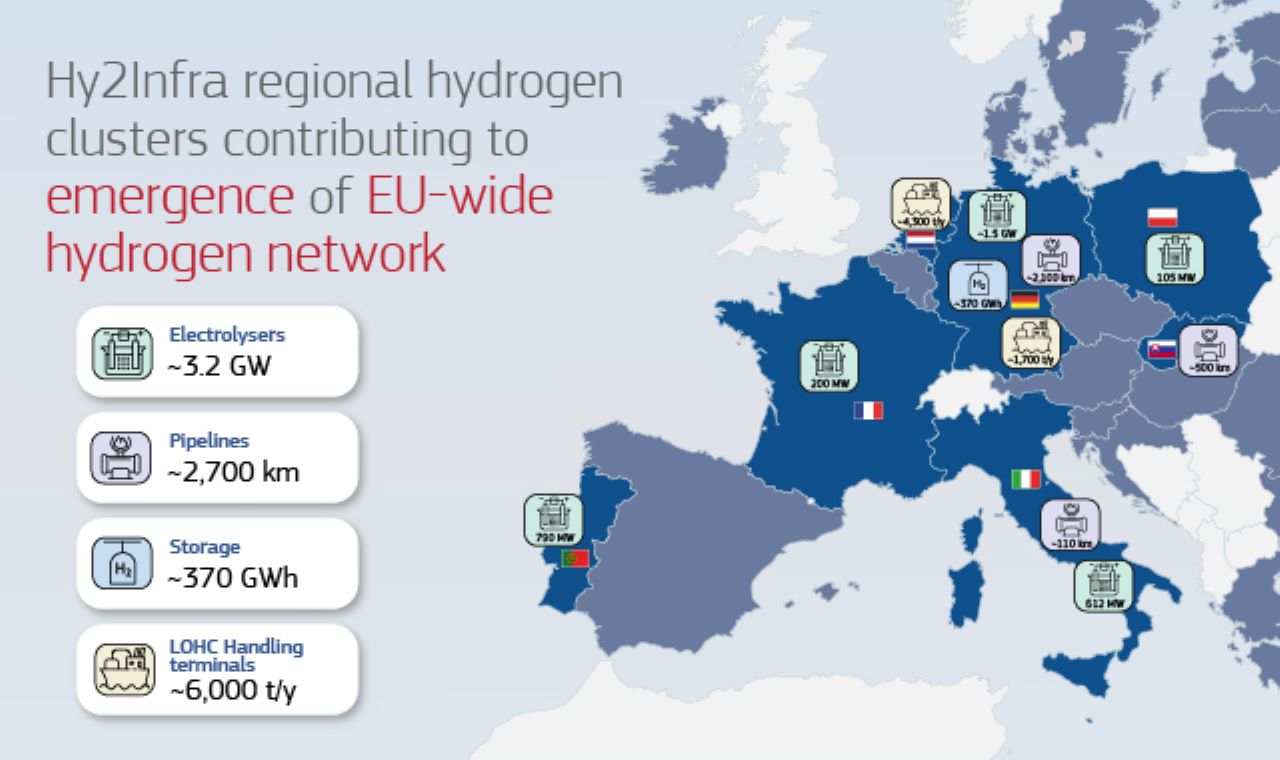-
New directive will help decarbonise the gas sector to tackle climate change
-
MEPs secured measures to protect vulnerable consumers and to ensure transparency
-
EU countries will be able to restrict imports from Russia
-
To shift away from fossil gas, the legislation will promote biomethane and hydrogen
On Thursday, MEPs adopted plans to facilitate the uptake of renewable and low-carbon gases, including hydrogen, into the EU gas market.
The new directive and regulation on the gas and hydrogen markets aim to decarbonise the EU’s energy sector, enhancing the production and integration of renewable gases and hydrogen.
These measures are designed to secure energy supplies disrupted by geopolitical tensions, particularly the Russian war against Ukraine, and address climate change. In negotiations with Council on the directive, MEPs focused on securing provisions around transparency, consumer rights, and support for people at risk of energy poverty. Plenary adopted the directive with 425 votes in favour, 64 against and 100 abstentions.
The new regulation, adopted with 447 votes in favour, 90 against and 54 abstentions, will beef up mechanisms for fair pricing and stable energy supply, and will allow member states to limit gas imports from Russia and Belarus. The legislation will introduce a joint gas purchasing system to avoid competition among member states and a pilot project to bolster the EU’s hydrogen market for five years.
The regulation also focuses on increasing investments in hydrogen infrastructure, especially in coal regions, promoting a transition to sustainable energy sources like biomethane and low-carbon hydrogen.
Quotes
Lead MEP on the directive Jens Geier (S&D, DE) said:
“Europe’s steel and chemical industries, which are hard to decarbonise, will be placed at the centre of the development of a European hydrogen market. This will enable fossil fuels to be phased out of industry, secure European competitiveness, and preserve jobs in a sustainable economy. Unbundling rules for hydrogen network operators will correspond to existing best practices in the gas and electricity market.”
Lead MEP on the regulation Jerzy Buzek (EPP, PL) said:
“The new regulation will transform the current energy market into one based primarily on two sources – green electricity and green gases. This is a huge step towards meeting the EU’s ambitious climate goals and making the EU more competitive on global markets. We have introduced a legal option for EU countries to stop importing gas from Russia if there is a security threat, which gives them a tool to phase out our dependence on a dangerous monopolist.”
Next steps
Both texts will now have to be formally adopted by Council before publication on the Official Journal.
Background
The legislative package reflects the EU’s growing climate ambitions, as set out in the European Green Deal and its ‘Fit for 55’ package. The updated directive aims to decarbonise the energy sector and includes provisions on consumer rights, transmission and distribution system operators, third-party access and integrated network planning, and independent regulatory authorities. The updated regulation will push existing natural gas infrastructure to integrate a higher share of hydrogen and renewable gases, by means of high tariff discounts. It includes provisions to facilitate blending hydrogen with natural gas and renewable gases, and greater EU cooperation on gas quality and storage.
Further information
EU-Abgeordneter Jens Geier: “Energie günstig und nachhaltig machen”
Das Europäische Parlament hat heute über die Trilogergebnisse zur Reform des Strommarktdesign und zum Gaspaket abgestimmt. Während die darunter gefassten EU-Verordnungen unmittelbar nach ihrem Inkrafttreten gültig sind, haben die Mitgliedstaaten zwei Jahre Zeit, die entsprechende Richtlinie umzusetzen.
Jens Geier, und Berichterstatter für die Gasmarktverordnung und industriepolitischer Sprecher der Europa-SPD:
“Mit der Reform des Strommarktdesigns hat das Parlament klare und einheitliche Bedingungen für die Finanzierung von erneuerbaren Energien in Europa beschlossen. Der Ausbau von erneuerbarem Strom wird maßgeblich dazu beitragen, die EU vollständig unabhängig von russischem Gasimporten zu machen. Als Sozialdemokrat:innen im Europäischen Parlament haben wir unser Versprechen gehalten und angesichts der Energiekrise die Rechte von Verbraucher:innen gestärkt: Zum Beispiel sind vulnerablen Gruppen oder Haushalte in Energiearmut in Zukunft besser gegen Abschaltungen von Strom und Gas geschützt.
Die Strompreise sollen wieder stabiler und bezahlbarer werden, indem Preisvorteile durch den Ausbau von erneuerbarem Strom weitergegeben werden. Die Reform ist ein erster Schritt, um die Wettbewerbsfähigkeit der energieintensiven Industrie in Europa durch verlässliche und günstigere Strompreise zu stärken.
Das Europäische Parlament hat außerdem die rechtlichen Grundlagen für einen europäischen Wasserstoffmarkt gelegt, die den Beginn des Ausstiegs aus dem Erdgas markieren und eine nachhaltige Produktion in Europa ermöglichen. Wasserstoff soll in schwer zu dekarbonisierenden Sektoren priorisiert werden, um den Wandel der europäischen Industrie zu unterstützen und den Ausstoß von Treibhausgasen einzudämmen.
Auf Drängen des Europäischen Parlaments ermöglicht das Trilogergebnis mehr Sicherheit für Investitionen in die Infrastruktur für Wasserstoff auf der Grundlage des bestehenden Erdgasnetzes. Es gelten nun Entflechtungsregeln für den Transport von Wasserstoff, die bereits aus dem Gas- und Strommarkt bekannt sind.”
Quelle – Europa-SPD
Verband Kommunaler Unternehmen: Gasnetzbetreiber dürfen künftig Wasserstoffnetze betreiben
VKU-Sprecher: „Die heutige Entscheidung ist ein großer Erfolg für die Stadtwerke und für einen erfolgreichen Wasserstoff-Hochlauf in Deutschland.Eine unternehmerische Trennung zwischen Gas- und Wasserstoffnetzen hätte es vielen Stadtwerken nahezu unmöglich gemacht, eine investitionssichere Transformation der Gasinfrastruktur einzuleiten und damit die Produktion und die Verteilung von Wasserstoff zu organisieren. Zudem wäre den rund 1,8 Millionen Industrie- und Gewerbekunden, die in Deutschland am Gasverteilnetz angeschlossen sind, eine elementare Option genommen worden, ihren CO2-Ausstoß zu reduzieren. Schließlich sind viele dieser Kunden, insbesondere im produzierenden Gewerbe, auch künftig auf gasförmige Energieträger angewiesen.“
Nächste Schritte: Nach der Abstimmung im Europäischen Parlament muss der Ministerrat die politische Einigung noch formal annehmen. Anschließend können Richtlinie und Verordnung des EU-Gas/H2-Binnenmarktpaketes im EU-Amtsblatt veröffentlicht werden. Dann steht die Umsetzung der Richtlinie in nationales Recht an.

